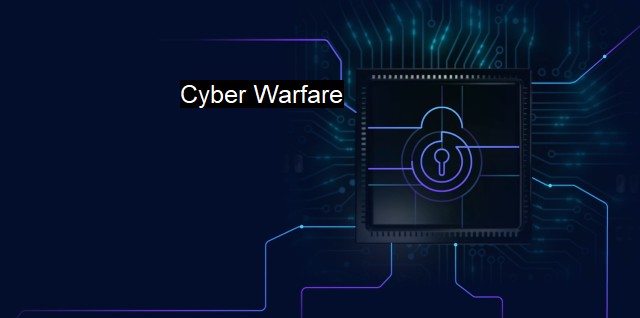What is Cyber Warfare?
The contemporary menace: Understanding cyber warfare & safeguarding against cyber attacks
Cyber warfare refers to the significant and increasingly real battleground portrayed into the virtual world of computing in the context of national defense and international relations. It happens when one nation state orchestrates a series of actions against other nation's computer systems, data, and networks. These actions aim to disrupt, disable, or destroy critical systems to gain an advantage, create disruption or even destabilize. Cyber warfare is regarded as the fifth dimension of warfare, following land, sea, air and space.It would be simplistic to imagine cyber warfare as some form of a stereotypical hacking activity. In many ways, the term transgresses such imaginations and digs much deeper into the critical interplay of technology, politics, and strategic planning. While it's certainly true that many activities within cyber warfare entail exploiting vulnerabilities within systems, the cyber warfare goes a step further. It's about orchestrating and coordinating attacks that could deal devastating blows to the economic and security apparatus of an enemy state.
In the fastest-growing arena of warfare, state-sponsored or conduct hackers use malware or ransomware attacks, stealing sensitive data, disrupting or disabling essential services, or conducting a stealthy infiltration into the national defense and infrastructural space of the enemy state. One of the most well-known examples of recent years would be the Stuxnet worm, a piece of malicious software allegedly developed by the US and Israel, which targeted Iranian nuclear power facilities, affecting the operational capabilities of enriched uranium manufacturing units.
Modern nation-states are increasingly investing in defensive and offensive cyber capabilities, their computer systems are caught-up in a never-ending cat and mouse chase with hackers intent on exploiting their weaknesses. This situation leads to the essential intersection of cybersecurity and antivirus within the context of cyber warfare. State-sponsored hacking attempts or even freelanced hacking efforts are combining volumes of malware and ransomware with incognizant systems users across the globe, accentuating the need for more robust antivirus labs and cybersecurity policies.
In the backdrop lies the advanced persistent threats (APTs) which are continuous malicious activities by groups or individuals. Targeting entities, these APTs breach systems to establish a base and operate over lengthy periods, weaving complex long-term strategies, sometimes commissioned by nation states. Detecting and responding to APTs have led to integrated and dynamic cybersecurity systems to anticipate threats, respond in real-time, and maintain integrity.
Antivirus software, on the other hand, is the beating heart of cybersecurity, making it the frontline soldier against cyber warfare. Synonymous with safeguarding systems against viruses, spyware, and other unsolicited software, antivirus software has grown more sophisticated with advanced persistent threats. A few successful examples include heuristic analysis to detect unknown viruses, constant upgrades to match newer threats, complete system scans, etc.
The comprehensive nature of modern antivirus packages, offers features like VPN for secure browsing, encrypted password management, and even independent disk recovery software. Prevention is a crucial notion of cybersecurity, and antivirus software embodies this sentiment extremely well.
The fact is clear that cyber warfare is an inevitable truth, and the digital world continues to evolve in both offensive and defensive capabilities. As the threats develop, antivirus systems and cybersecurity policies must fulfill the responsibility of protecting computer and network systems from attacks that could undermine national security, infringe upon privacy, disrupt economic activities or sow seeds of chaos within the general populace. It’s undeniably crucial now more than ever for all institutions, either government agencies or private businesses, to step-up investment and focus on the most effective cybersecurity policies and tools to combat this persistent problem. Cybersecurity practices like updated antivirus solutions, encryption, robust firewalls, intrusion detection systems, have become a necessity not just for institutions but for individual internet users as well.

Cyber Warfare FAQs
What is cyber warfare?
Cyber warfare refers to the use of technology and computer networks to conduct acts of sabotage, espionage, and acts of war against a nation or organization. Cyber warfare involves the use of malware, viruses, and other types of cyberattacks to target critical infrastructure, government systems, and private networks.What types of cyberattacks are commonly used in cyber warfare?
Some of the most common types of cyberattacks used in cyber warfare include malware attacks, DDoS (Distributed Denial of Service) attacks, phishing attacks, and SQL injections. These attacks are designed to disrupt critical infrastructure, steal sensitive information, and gain unauthorized access to networks.What is the impact of cyber warfare on national security?
Cyber warfare poses a significant threat to national security as it can cause disruption and chaos in critical infrastructure, such as power grids, water supply systems, and transportation systems. Cyberattacks can also compromise sensitive government data and lead to espionage, which can harm a nation's economic and military interests.How can individuals and organizations protect themselves against cyber warfare attacks?
Individuals and organizations can protect themselves against cyber warfare attacks by using strong passwords, keeping their antivirus software updated, and regularly backing up their data. It is also important to be cautious when clicking on links or opening email attachments from unknown sources. Organizations can implement cybersecurity measures such as firewalls, intrusion detection, and prevention systems, and employee training programs to prevent cyber attacks.| | A | | | B | | | C | | | D | | | E | | | F | | | G | | | H | | | I | | | J | | | K | | | L | | | M | |
| | N | | | O | | | P | | | Q | | | R | | | S | | | T | | | U | | | V | | | W | | | X | | | Y | | | Z | |
| | 1 | | | 2 | | | 3 | | | 4 | | | 7 | | | 8 | | |||||||